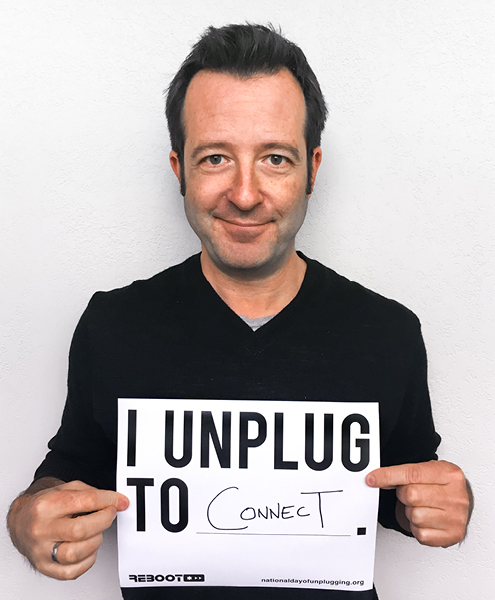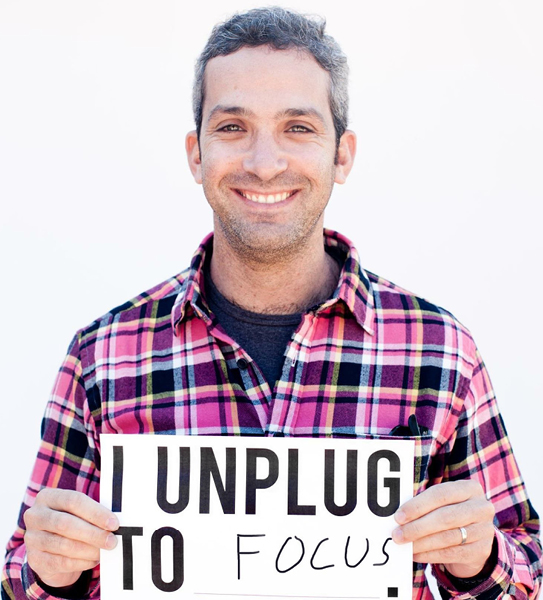
Confession #1
I love technology. I love how it forges profoundly rich connections for us, makes the world accessible in unexpected ways, entertains, automates, and informs us.
But when Shabbos comes, my iPhone (and laptop and tablet) goes. It is what some have taken to calling an “analog” experience, and it is one I treasure.
Confession #2
I’m not a particularly observant person, and I wasn’t raised lighting candles on Friday nights. But the notion that an ancient Jewish tradition requires that we unplug once a week feels particularly relevant in the 21st century.
It is a notion that inspired some of us to try and spark a modern movement.
When I turned off my phone at sunset on Friday, March 19, 2010, tens of thousands joined me. Many were doing so in observance of Shabbos (Yiddish for Shabbat), but countless more were trying it out for the very first time in response to Reboot’s call for a “National Day of Unplugging.” Reboot, the think tank and incubator for modern Jewish culture that I was running at the time, is always looking for innovative approaches to Jewish ritual, tradition, and culture—as well as looking for high-profile allies to join in. It didn’t hurt that for our first attempt at creating a national holiday, Katie Couric—then the anchor for the CBS Evening News—encouraged all her viewers to join in.
“You've got mail?” she asked on her Thursday evening broadcast. “More like you've got an addiction… Put down that blackberry, connect with loved ones, take a walk outside.”
The idea just feels right, especially when we end up curled up on the couch after dinner reading a book with our children.
But what does unplugging from technology have to do with ancient ritual, anyway? After all, they didn’t have smartphones back then. So, nu? Who knew? It turns out that the cure for our uniquely modern affliction was discovered 3,000 years ago.
And it all comes down to sparks.
The original directive that forbids the “burning of fire in all your dwellings on the day of Shabbat” (right after you light a candle to welcome the Shabbos Queen) is found in the Torah and generally understood to include any action that might produce a spark. As society and technology evolved, interpretation of this prohibition was applied to the act of heating a metal pot (cooking), and then heating metal at all (though Maimonides viewed the heating of metal as a subcategory of lighting a fire only if it was intended for metalwork). However, more conservative views prevailed and eventually the heating of a metal filament (i.e., flipping a switch that caused a spark as it illuminated an incandescent lightbulb) was added to the melachot, or 39 categories of creative activities prohibited on Shabbos. While many Jews still observe this strict set of injunctions, others go about their Friday evening and Saturdays cooking, cleaning, driving, and Facebooking. Still, there is no question that the desire for some kind of reprieve is nearly universal. As we become increasingly dependent on our devices and online communities, we also seem to be seeking a way to escape from being perpetually tethered and always accessible.
Seven years on, the National Day of Unplugging (NDU) has become a fixture of the calendar. For tech-addled adults, a digital detox is a much-needed respite. And for those of us with children in our midst, it forces us to face very real questions about how the increasingly digital nature of our lives is impacting our children.

“The research I did for my book told me this is not what kids need,” says David Sax, author of The Revenge of Analog, a New York Times Top 10 book of 2016. “They need to be rolling around in the basement and playing.” Sax, a PJ Library parent based in Toronto, isn’t a Luddite: “We were on a five-hour flight with our 4-year-old daughter and you better believe she was on my phone watching Frozen three times over.”
But he and his wife have established clear limits on when and where their daughter is on a screen. And when the tech is off, the books come out.
For families who unplug, reading isn’t just a way to fill the time: It’s a matter of good physical and intellectual health. In 2014 the American Academy of Pediatrics announced a new policy recommending that all parents read to their children from birth. And the following year, the journal Pediatrics published a study that used functional magnetic resonance imaging to study brain activity in 3-to 5-year-old children as they listened to age-appropriate stories. The researchers found differences in brain activation according to how much the children had been read to at home.
For Sax, PJ Library adds another layer of analog delight. “The best thing about the PJ Library program for my daughter is the fact that she actually gets something in the mail. It’s a rare joy that most of us adults see as a chore, but for children born today, receiving their own monthly gift with their own name on it is kind of magical. She jumps up and down and tears open the envelope, and we stop and sit on the couch and read that book right then and there, regardless of what time it is or what else is going on. That’s the kind of moment that makes an impression, and one that we all share in together, because we all need to sit down and read the book about whatever mishigas [Yiddish for craziness] Sammy Spider is up to.”
What’s more, Sax sees the benefits of PJ Library as extending long after the phones are turned back on and the latest book is put back on the shelves. It’s the "library" part of PJ Library that has a long-term benefit for his family, not just as a way to connect, educate, or entertain—but to cement a Jewish identity that his daughter will take with her into adulthood and share with her own children.
“When you get a digital book, you read it once and then it disappears,” Sax explains. “PJ Library is different. Every Hanukkah we go back into our PJ Library books and return to those stories. It is through the physicality that you build the deeper relationship and learning. It lives on in the bookshelf, and it reinforces what we’ve already learned about who we are and where we come from.”
Tradition requires that we unplug. Reading with our children when we do can ensure that this sacred tradition—and so many others—lives on.
The spark of this idea—that we should take a break from technology to connect with the people and principles that matter most, and to do so in the real world, not the virtual world—has managed to ignite childrens’ imaginations, inform their Jewish sense of self, and become a consistent discipline I hope will carry on throughout their lives. That is a spark that even the most observant among us would allow.
LOU COVE is a senior advisor to numerous nonprofits, including the Harold Grinspoon Foundation, and is the former executive director of Reboot, a network of young Jewish media professionals and cultural creatives. Lou has fond memories of Shabbos afternoons curled up on the couch reading PJ Library books to his children when they were young.